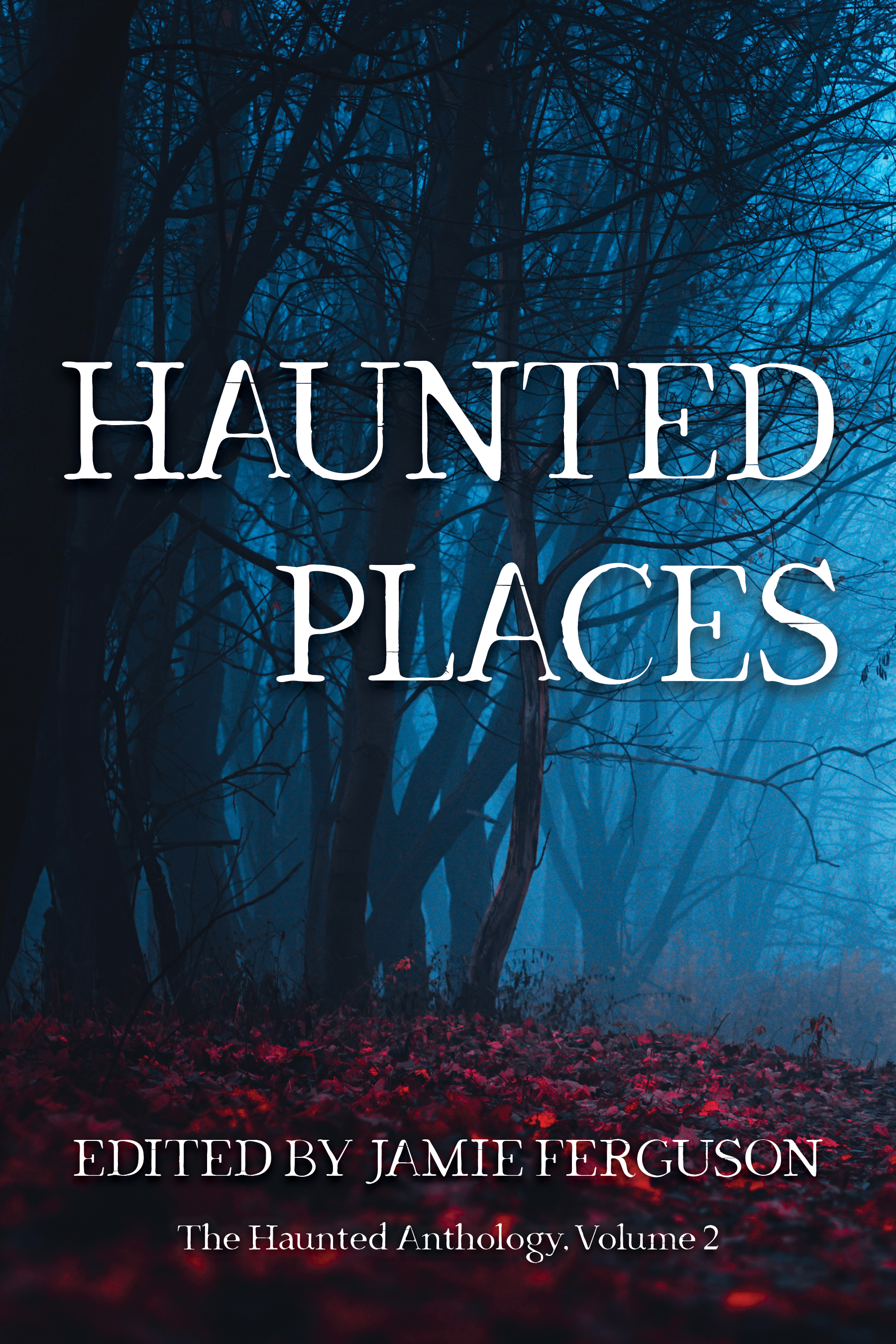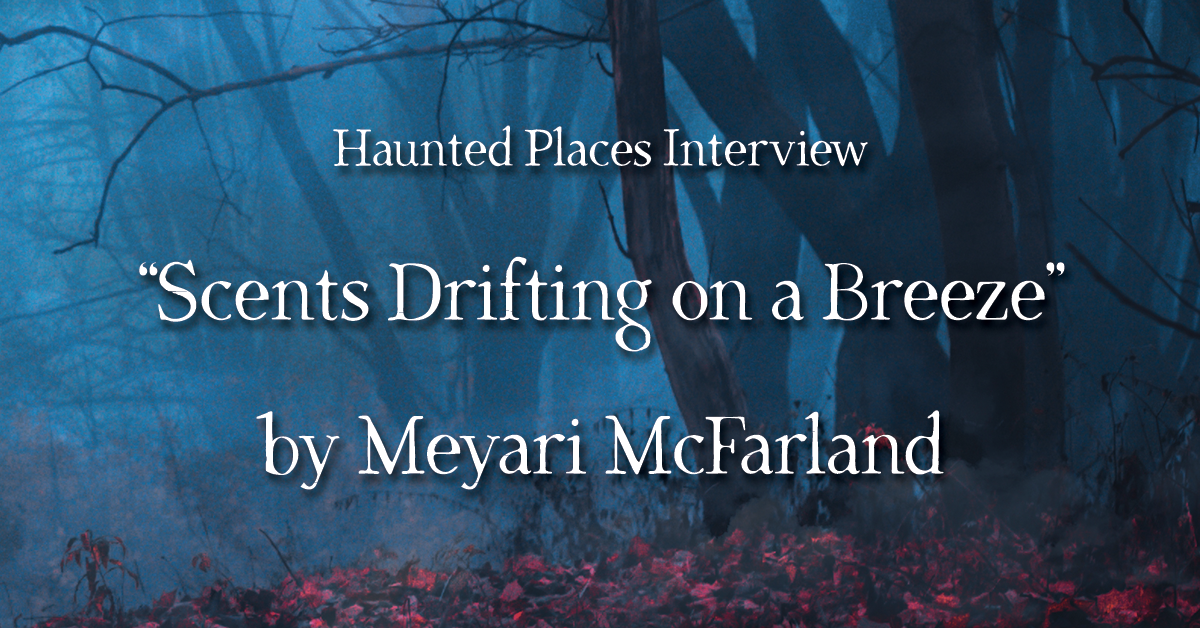Interview: “Scents Drifting on a Breeze” by Meyari McFarland
A forgotten funerary urn, a quiet crush, and a ghost who has waited too long for someone to listen—the museum’s ordinary displays an extraordinary story.
In “Scents Drifting on a Breeze,” Meyari McFarland weaves a soft, romantic ghost story about memory, recognition, and the overlooked spaces where connection quietly blooms. As a museum worker puzzles over an unassuming artifact—and her growing feelings for a colleague—she finds herself drawn into a haunting that asks for compassion, not fear. Gentle, emotionally resonant, and full of quiet magic, this story speaks to the moments when the past and present brush fingertips and change everything.
Interview Questions
What does “haunted” mean to you—and how does that idea show up in your story?
I’m generally a skeptic about hauntings. Despite having been to multiple places that are very haunted indeed, I’ve never experienced anything personally. People have seen or heard or felt things around me, but for me, there’s never been a sign of anything supernatural.
For me, “haunted” is a matter of the history of a place. When I was little, I wanted to be a paleontologist. Not to dig up dinosaur bones, but to understand the world as it was when it was a completely different place. When I go someplace that has history, like McAllister Mansion which is based on several different mansions I’ve visited, I feel the weight of the lives that passed through. I notice the evidence of people and events rather than anything spooky.
Maybe that’s why I haven’t been haunted. I’m too busy studying what’s left behind for the ghosts to get at me. It certainly informed how I wrote Callie. She’s all about the history of the mansion and the people who lived there. Callie, unlike me, gets to see and meet the ghost she’s haunted by. I’m a little jealous that she gets that when I don’t, and yet not really. The weight of history is enough haunting for me.
Did this story start with a particular place, moment, or image that stuck with you?
This story started from a smell actually. The smell of rot and dust; a while ago, my spouse and I had to tear down an old shed. It was on the verge of collapsing if the wind blew too hard, desperately unsafe to have around, much less go into. When we tore it down, it was a hot day in August so everything was dry and dusty.
But as soon as we knocked it down, the wet smell of rotting wood filled the air. The shed was an utter mess and that smell, dust and rot mingled together with sweat and a little bit of fear stuck with me over time. It was a natural place to start the story when smells are so very powerful.
The ghost in this story feels more like it’s helping than haunting. What made you want to write that kind of presence?
One of the things I strongly believe is that what we put out into the world is what we get back from it. I’m a Buddhist, so it’s a real thing that I try to do on a daily basis. When I sit down to write, I rarely plan ahead. I’ll have a vague idea of what I want to start with, but the story I end up with rarely matches the idea I started from.
In this case, I started with the smell of rot in a beautiful old Victorian mansion. I knew that there would be a ghost haunting the room, but I knew exactly as little about the source of the smell as Callie did.
The contrast between Callie’s determination to have everything right and her coworker’s casual disrespect was the razor blade that the tone of the story teetered on as I wrote. If Callie hadn’t won, the Chinese granny would have been a much more violent, harmful ghost. But Callie was polite and respectful and so hard-working that the Chinese granny more or less adopted her as I wrote.
So, Callie lived my Buddhist principles of embodying what she wanted. Callie convinced the ghost. And the story cycled around to the Chinese granny settling in to be helpful and kind rather than vengeful.
Callie’s a funny, frustrated, determined lead—what helped you get her voice just right?
Oh, that’s easy. Callie’s a lot like me. I tend to have exactly her attitude of “this must be done so I’ll get right to it”. I wouldn’t say that I’m especially funny in person. I’d certainly be deeply frustrated by her situation. Still, getting her voice right was more a matter of getting the first few paragraphs firmly from her point of view and then letting her go at it.
The McAllister Mansion feels like it’s lived a dozen lives. How did you shape its history and atmosphere?
McAllister Mansion is based on several mansions that I’ve visited. The first one I ever visited was the Conrad Mansion Museum in Kalispell, MT. It’s a gorgeous, huge mansion full of authentic furniture and beautiful historic clothes set up to show the residents’ everyday lives. I saw it on a school trip when I was in middle school and it’s stuck with me ever since.
The thing that I remember the most from that long-ago visit is the cramped feeling of the rooms. They were dark and grandly decorated, but most of the rooms were only a few paces across. It made that huge, impressive house feel like you were being constricted inside of it, like there wasn’t enough air to breathe.
I’ve also seen Japanese castles that struck me in the same way. They’re old, grand, beautiful and deeply empty places now that no one lives there. Once, they were full of rich and powerful people. Once history happened there. Now there’s nothing but tourists and an echoing sort of emptiness as history has left the castles behind.
The actual McAllister Mansion is based on a big old Victorian house that was converted into apartments in Everett, WA. I’ve never been inside of it, but it fit what I needed, both in the location and the size of the house. It also had that wonderful garden with the covered path to the shed which I just had to put into the story.
The Chinese granny ghost plays a memorable and mysterious role in the story. What inspired her character, and her connection to the house?
When I started writing, I knew that I would have a ghost who was haunting an object in the room. I hadn’t chosen what that object would be. At first, I thought it would be the sofa, but that didn’t fit as I wrote so I found pictures of Conrad Mansion online. One of the things I noticed was that there were lots of little vases.
So I looked for a vase that had a lid because I wanted to have Callie’s coworker abscond with it and then get scolded for it.
The only vases with lids that I could find were funerary vases. From there it was a matter of checking that the Chinese had gone through Seattle and Everett, WA to work on the cross-continental railroad and in the gold rushes. They had. They’d not been treated well at all.
Thus the vase became my haunted object. Turning the ghost into a granny was just impulse as I wrote but as soon as she showed up, I had to keep her.
The thing about the Chinese granny is that she has absolutely no connection to the house. She was never there. She never met the McAllisters. She died elsewhere and her funerary vase was stolen as a curio that was put on display. The disrespect is what kept her there. Callie’s respect and work to discover who she was is what ensured that the haunting wasn’t a bad one.
Women helping women is one of the ever-present themes in my stories. First time that it was from beyond the grave!
What are you working on now—and what’s fun or exciting about it?
My current project, temporarily titled Hazelnut, was inspired by the election. Which, you know, not the greatest thing, there. I was so angry and frightened that I decided that I’d write a story in which the main character had the power to change everything so that her family and friends would be safe and happy.
Of course, things definitely got out of hand almost immediately. I’d planned on it being a longer short story, maybe novella length at most. Took me about one day of writing to realize that nope, this is going to go big.
I’m over 40K as I write and I think I’m maybe one third into the story. It’s going to be long. Epic length. But it has all the things I need right now (women helping each other be safe, girls learning their own strengths and supporting each other, parents who give a damn and take care of their kids). It has all the things I want (real change that’s self-sustaining, powerful people facing consequences, a world I’d love to live in despite the problems there).
And it’s fun to write. As in, I find myself telling the story to myself as I drive or eat or do other things away from the keyboard. There are stories that take work to get on the page. And there are stories that invade my dreams. Hazelnut is one of the stories that leaps out of my brain and onto the page and that’s always a wonderful thing.
About the Author
Meyari McFarland has been telling stories since she was a small child. Her stories range from SF and Fantasy adventures to Romances, but they always feature strong characters who do what they think is right no matter what gets in their way.
Her series range from Space Opera Romance in the Drath series, to Epic Fantasy in the Mages of Tindiere world. Other series include Matriarchies of Muirin, the Clockwork Rift Steampunk mysteries, and the Tales of Unification urban fantasy stories, plus many more.
Find Meyari at: mdr-publishing.com
Read the Story
“Scents Drifting on a Breeze” appears in Haunted Places, available now from Blackbird Publishing.
📚 Buy the book from your favorite store


